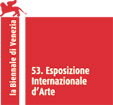 |
||||
|
||||
ARTEXT : La Biennale di Venezia
CONDENSATION
In the exhibition “Condensation”, Haegue Yang explores private or hidden spaces that might be considered nebensächlich (marginal or insignificant) but to the artist constitute profound backdrops for understanding: the vulnerable sites where informal development can occur. Using the metaphor of condensation, Yang seeks direct communication with unknown people through a seemingly intangible path of exchange, one that imparts nonfunctional yet ontologically significant information. As the artist explains: "I imagine metaphorically that I preserve cool air in me as long as I can, until the temperature difference is so great that water drops collect on the bottle. I would like to transmit things to others without pouring water out of the bottle. I believe that people can be mobilized by this condensation, which is a kind of direct reaction, without needing to negotiate specificities". Eungie Joo - You often develop works that require the subjectivity of the viewer—a Haegue Yang - It might sound absurd to bring up a scientific metaphor to address how I would like to For me, refusing specific stories and replacing them with something “blind” or “silent” is a conceptually ethical process, because it fundamentally prevents me from taming my audience with my learning and experience. The researched knowledge and lived experiences remain transparent, yet are accessible only if I am asked about them. The audience is therefore quite free of my own personal trajectories, whether related to my grandmother or historical figures who mean a lot to me. I don’t deny that some of the audience would interpret such layers as meaningful and might wonder why I don’t actively elaborate on those references. Since I am conscious about the exploitative aspect of self-reference and desire to reach beyond each individual narrative, I would rather continue to “unlearn” my own position in order to remain “impersonal” in the work. That is how I relate myself to the notion of subjectivity.
Curatori : Eungie Joo
Web site : http://www.labiennale.org |
||||
Artext © 2009 |